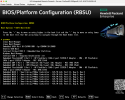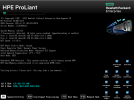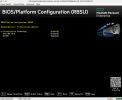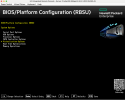Hallo dcsapak,ah ok hier sieht man den fehler:
das system bootet mit zfs auf uefi, da wird nicht via grub sonder systemd-boot gebootet
hier muss man die kernel cmdline anders anpassen
siehe: https://pve.proxmox.com/wiki/PCI(e)_Passthrough#_general_requirements
(linkt unter anderem auf) https://pve.proxmox.com/wiki/Host_Bootloader#sysboot_edit_kernel_cmdline
ich versuche gerade IOMMU auf meinem HPE ProLiant DL380 gen9 zu aktivieren (mit CPU E5-2650v3, die definitiv IOMMU unterstützt).
Obwohl ich alle Schritte so wie in der PVE Wiki befolge, ist mein Output des Befehls: "dmesg | grep -e DMAR -e IOMMU"
Code:
root@proliant:~# dmesg | grep -e DMAR -e IOMMU
[ 0.000000] ACPI: DMAR 0x000000007B7FD000 000294 (v01 HP ProLiant 00000001 HP 00000001)
[ 0.000000] ACPI: Reserving DMAR table memory at [mem 0x7b7fd000-0x7b7fd293]
[ 0.000000] DMAR: Host address width 46
[ 0.000000] DMAR: DRHD base: 0x000000fbffc000 flags: 0x0
[ 0.000000] DMAR: dmar0: reg_base_addr fbffc000 ver 1:0 cap d2078c106f0466 ecap f020df
[ 0.000000] DMAR: DRHD base: 0x000000c7ffc000 flags: 0x1
[ 0.000000] DMAR: dmar1: reg_base_addr c7ffc000 ver 1:0 cap d2078c106f0466 ecap f020df
[ 0.000000] DMAR: RMRR base: 0x00000079174000 end: 0x00000079176fff
[ 0.000000] DMAR: RMRR base: 0x000000791f4000 end: 0x000000791f7fff
[ 0.000000] DMAR: RMRR base: 0x000000791de000 end: 0x000000791f3fff
[ 0.000000] DMAR: RMRR base: 0x000000791cb000 end: 0x000000791dbfff
[ 0.000000] DMAR: RMRR base: 0x000000791dc000 end: 0x000000791ddfff
[ 0.000000] DMAR-IR: IOAPIC id 10 under DRHD base 0xfbffc000 IOMMU 0
[ 0.000000] DMAR-IR: IOAPIC id 8 under DRHD base 0xc7ffc000 IOMMU 1
[ 0.000000] DMAR-IR: IOAPIC id 9 under DRHD base 0xc7ffc000 IOMMU 1
[ 0.000000] DMAR-IR: HPET id 0 under DRHD base 0xc7ffc000
[ 0.000000] DMAR-IR: Queued invalidation will be enabled to support x2apic and Intr-remapping.
[ 0.000000] DMAR-IR: Enabled IRQ remapping in x2apic mode
root@proliant:~#mir sagt dieser Output aber leider nichts... außer, dass die Aktivierung von IOMMU nicht funktioniert hat (dasselbe sagt das Proxmox Interface wenn ich versuche, eine PCI Hardware an eine VM zu hängen).
Ich bin auf deinen Tipp gestoßen, zu schauen ob in "nano /proc/cmdline" auch steht, dass das System via systemd-boot und nicht via grub bootet. In der Datei /proc/cmdline steht bei mir ebenfalls:
Code:
initrd=\EFI\proxmox\5.13.19-2-pve\initrd.img-5.13.19-2-pve #root=ZFS=rpool/ROOT/pve-1 boot=zfsIch habe aber auch wie in der Wiki beschrieben "/etc/kernel/cmdline" mit
Code:
root=ZFS=rpool/ROOT/pve-1 boot=zfs quiet intel_iommu=onum "intel_iommu=on" erweitert und mit dem Befehl "pve-efiboot-tool refresh" die Änderungen übernommen.
Interessanterweise, wenn ich aber den Befehl "cat /proc/cmdline" abschicke, kommt zurück:
Code:
initrd=\EFI\proxmox\5.13.19-2-pve\initrd.img-5.13.19-2-pve #root=ZFS=rpool/ROOT/pve-1 boot=zfsals wäre die Änderung garnicht übernommen worden?
Fällt dir ein, was das Problem sein kann?
Ich bin um jede Hilfe dankbar.
Last edited:





